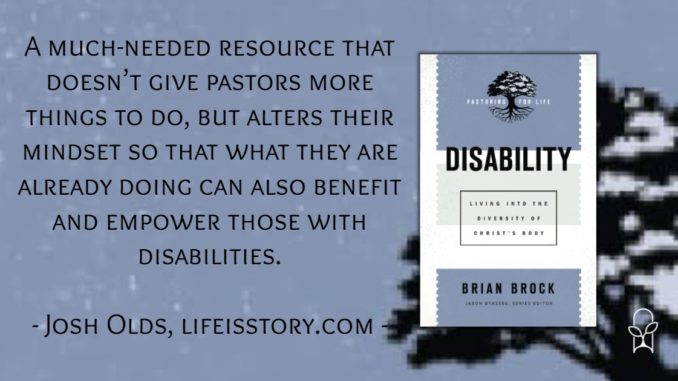
Also by this author: Wondrously Wounded: Theology, Disability, and the Body of Christ, Friendship: The Heart of Being Human, Following: Embodied Discipleship in a Digital Age
Published by Baker Academic on May 18, 2021
Genres: Academic, Non-Fiction, Christian Life, Theology
Buy on Amazon
Goodreads

Leading ethicist and pastoral theologian Brian Brock reflects on the challenge of disability, refuting widely held misconceptions and helping readers respond well to the pastoral implications of disability. Brock, the father of a child with special needs, weaves together theological commentary with narrative reflection, offering rich theological wisdom for shepherding people with disabilities. He shows pastors and ministers-in-training that thinking more closely and theologically about disability is a doorway into a more vibrant and welcoming church life for all Christians.
Early on in the book, Brian Brock writes that the majority of pastors, when asked how their church accommodates individuals with disabilities, respond with some form of “Oh, we don’t have any members with disabilities.” If this is true, then huge numbers of people are not in church. If false, then why are pastors not seeing what’s right in front of them. Either way, there’s a problem.
Disability: Living into the Diversity of Christ’s Body is a foundational look at that problem and how churches and church leaders can work towards its resolution. The answer the Brock provides isn’t what most would term “practical.” Accessibility isn’t about wheelchair ramps, special education Sunday School, or trained staff (though that’s part of it!). Instead, the answer lies deeper in how disability is perceived—not as something to be accommodated or worked around, but as something to be welcomed.
The church’s problem with disability might stem from a flawed idea of Jesus’s ministry. That’s the subject of the second chapter. “Well, Jesus heals everyone he meets!” was the proclamation of one well-meaning individual. But the truth is, “A Jesus determined to miraculously make everyone ‘normal’ feels threatening to most disabled people.” Brock interprets the healing ministry of Jesus is the context of Jesus removing barriers to community. Disability kept individuals from their communities and kept them from the Temple. By healing, Jesus removes this barrier. Jesus, Brock says, is more concerned about community than what the community perceives as “normal.”
Chapters three and four interweave theological musings, biblical examples, and the countering of poor exegesis. For example, Brock makes the case that our human idea of physical wholeness might not be what God has in mind. In Luke 14, Jesus confronts a version of the gospel that leads to social prestige. He tells a story about a man inviting people to a great banquet, but only “the poor, the crippled, the blind, and the lame” will attend. That, Jesus says, is a picture of heaven. Note that outsiders and outcasts are not changed into social elites when they enter the banquet. In other words, God’s kingdom and disability are not incompatible. The two can exist together—and if we’re to believe Jesus, might even do so in eternity.
The final chapter turns to what might be deemed “practical advice.” It’s a primer on how to change one’s church and one’s posture to be welcoming to individuals with disabilities and provide an atmosphere where they can flourish alongside others. Part of me wishes that Brock had spent more time in this area because knowing something and knowing how to implement it often very different things. Part of me understands how our focus is so often on doing that we never focus on being. And that’s the true focus on the book: not to simply address outward actions but inward thoughts, it’s about thinking more theologically about disability.
As part of the Pastoring for Life series, this book is a much-needed resource alongside other books like it (see also Disability and the Church by Lamar Hardwick or Brock’s Wondrously Wounded). It doesn’t give pastors more things to do, but alters their mindset so that what they are already doing can also benefit and empower those with disabilities. It’s life-changing for the leader and will serve your community well.
